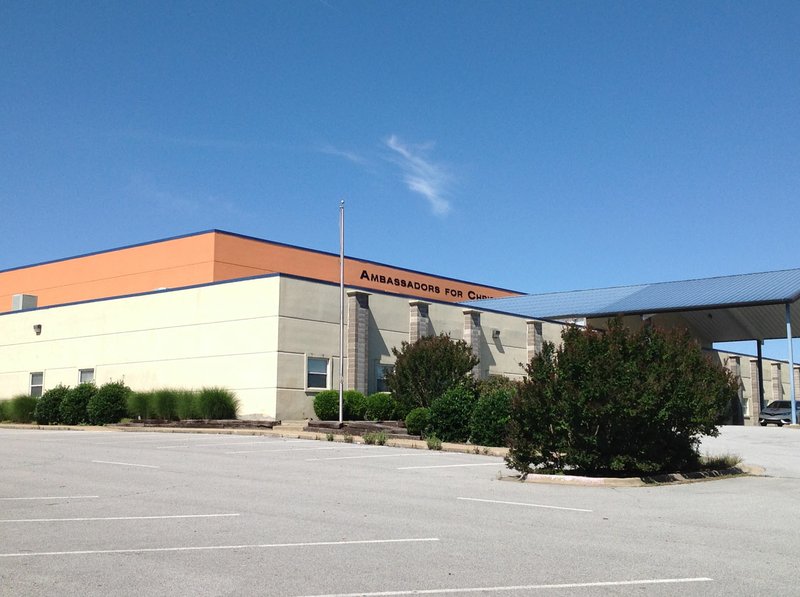BENTONVILLE -- The School Board approved two real estate deals Monday, agreeing to sell one building and buy another in what amounted to a significant upgrade in warehouse space.
The board voted 5-1 in favor of spending $2.8 million on a 52,000-square-foot building in north Bentonville that formerly was home to Ambassadors for Christ Academy. The School District will spend an additional $1 million to renovate the building so it may serve as a warehouse.
Fund balance
Here’s how the Bentonville School District’s fund balance has looked at the end of the past five fiscal years.
2017: $30,009,020
2016: $33,563,348
2015: $22,372,626
2014: $24,637,088
2013: $26,861,011
Source: Bentonville School District
The board also agreed unanimously to sell its current warehouse at 1003 S. Main St. for $1 million to Premier Holdings. The 12,000-square-foot building was appraised in April at $825,000, according to Janet Schwanhausser, district finance director.
A new warehouse has been on the district's capital improvement projects list since 2007. Neighboring districts similar in size to Bentonville have warehouses ranging in size from 36,000 to 58,000 square feet, Schwanhausser said.
Travis Riggs, board president, abstained from the vote on the district's purchase, saying he has a business relationship with Ambassadors for Christ Academy, which closed at the end of last school year.
Rebecca Powers was the only board member who voted against the purchase. After Monday's meeting, she explained she thought the building could be better used as a school rather than a warehouse.
"It's not because I don't trust [district administrators]. It's just that I've never been for spending that much money on a warehouse," Powers said. "I don't understand why, if we can renovate it for $1 million to make it a warehouse, why can't we renovate it to make a school, even a smaller one."
Paul Wallace, facilities director, addressed that issue at last week's board meeting. The building does not meet the state's requirements in terms of the space of its rooms, he said.
"We did a pricing exercise with architects and construction managers, and you could almost build a new facility for what it would cost to renovate that and bring it up to code," Wallace said at the board's Sept. 5 meeting.
To convert the building into a warehouse, the district needs to install a docking and receiving area, add a sprinkler system and create space for freezers and refrigerators, he said.
Inadequate warehouse space has been problematic because of the inefficiencies it creates for the district, Schwanhausser said.
The district buys things like paper, hand sanitizer and construction paper in bulk in order to cut back on costs, but it could make more bulk orders if it had additional space to store those kinds of things, Schwanhausser said.
She also cited an example from Thomas Jefferson Elementary School, which recently replaced its library furniture thanks to a gift from the parent-teacher organization.
"The tables that were in that library were still usable," she said. "Tables are something schools ask for from time to time. We did not have the space to store those, so we had to sell them."
The district also rents freezer space for food at a storage facility in Springdale because the warehouse doesn't have space for it, she said.
The district will retain possession of the current warehouse until it is able to move into its new warehouse in about a year, Superintendent Debbie Jones said. Jones did not know anything about the company buying the district's warehouse.
Also at Monday's meeting, the board unanimously approved a budget for the 2017-18 school year. Schwanhausser said the district expects to spend $169.3 million this year, about $83,000 less than what's anticipated in operating revenues. The district spent about $165.3 million last school year.
Much of the increase in the budget has to do with the opening of two new schools this year, Osage Creek Elementary and Creekside Middle schools.
The budget also contains at least a 1 percent raise for all staff. Schwanhausser said, however, she will wait until next month to make a final recommendation on raises. She said she wants to test the effects of different sizes of raises on the budget for the long term.
Much of the district's revenue from the state depends on enrollment. The state is providing districts $6,713 per student this school year.
Bentonville's enrollment as of Sept. 1 was 16,887, an increase of 218 students, or 1.3 percent, from exactly one year earlier. Officials had projected average gains of 3 percent per year in enrollment over the next several years. The district grew by 3.4 percent from the 2015-16 school year to last year.
Schwanhausser projects an ending fund balance of $30 million, equal to what the district began this fiscal year with on July 1. That's 17.7 percent of the operating budget. The fund balance has fluctuated between 15 percent and 22 percent of the operating budget since 2012.
NW News on 09/12/2017
